The world must not allow the loss of a single country or culture due to global warming or a continuation of a “two-speed financial world” where the rich get richer and the poor get poorer, said UN chief António Guterres in his opening address at the Fourth International Conference on Small Island Developing States (SIDS4) on the beautiful twin island nation of Antigua and Barbuda.
The UN, civil society, business, academia and youth activists, have gathered to chart a course towards resilient prosperity for existentially threatened island nations.
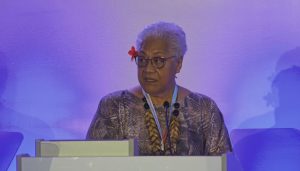
Guterres said along with their exceptional beauty – be it the blue waters of the Caribbean, South Pacific or the Indian Ocean – SIDS are also exceptionally vulnerable.
“Your unique geography puts you at the mercy of climate chaos, rising sea levels and land degradation. Climate change is an existential crisis for the entire human family, but SIDS are on the frontlines.”
Reliant on imports and complex supply chains, the global shocks of record extreme weather, the tourism destroying COVID pandemic and regional wars, many SIDS have been left reeling in rough waters.

“The new Antigua and Barbuda Agenda for SIDS outlines steps to achieve resilient prosperity in partnership with the international community”, said the UN chief.
“The United Nations stands with you” in battling the climate crisis; building resilient economies; safe and healthy societies, biodiversity conservation; “and to protect and sustainably use the ocean and its resources.”
He called on SIDS to make bold and sustainable investments themselves – but they can’t succeed alone.
“The international community has a duty to support you – led by the countries that have greatest responsibility and capacity to deal with the challenges you face”, he declared.
“SIDS are a test case for climate justice and financial justice”, he said, and with the 1.5 degree limit in temperature rise already fast approaching, “we cannot accept the disappearance of any country or culture under the rising waves.”
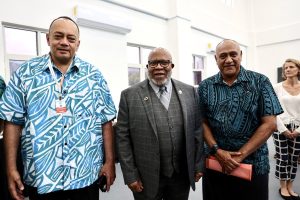
“The idea that an entire island state could become collateral damage for profiteering by the fossil fuel industry, or competition between major economies, is simply obscene.”
SIDS have led from the front for decades already, serving as the world’s conscience on the climate crisis – making the difference in Paris in 2015.
“Today, we need your fierce voices more than ever”, said the Secretary-General.
SIDS also need financial justice, he explained, urging leaders in Antigua to insist developed countries come through on pledges to double adaptation financing to allow proper defences to be built to save island nations from destruction.
“You also have every right to call for new and significant contributions to the Loss and Damage Fund. Some of your countries have suffered damage worth more than half their GDP overnight, in cyclones and storms”, Guterres said.
“But we are in a two-speed financial world. To the rich – cheap loans and easy money. But the global majority – the countries that need financing for development – are paying sky high costs to borrow money.”
The millstone of debt is drowning SIDS economies as the ocean erode the shore: “This is creating a vicious cycle of stress and vulnerability and constraining your ability to invest in the SDGs.”
He highlighted the need for an SDG Stimulus and deep reforms to the “outdated, dysfunctional and unjust global financial architecture”, putting the needs of developing countries first.
He said the temptation to turn inwards, and lower expectations must be avoided.
“That is not the SIDS way. Collaboration and mutual support will help SIDS to weather both geopolitical and physical storms.”
And when you speak together, SIDS can make an almighty noise. I urge you to do so at this critical time for our planet and our future.”
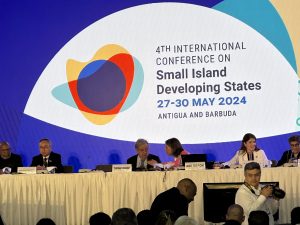
Prime Minister of Antigua and Barbuda Gaston Browne has just been elected to preside over SIDS4.
He said SIDS vulnerabilities placed them at a major disadvantage and large scale polluters should compensate countries for their exploitation.
The relentless climate crisis has severely undermined efforts to meet the SDGs, making the search for solutions all the more critical he said.
This year has been the hottest in history practically everywhere, underscoring the urgency of our predicament, he added.
“To ignore this is to gamble with our collective future. Continuing with business as usual is not just negligence, it is an active choice that invites disaster. Such indifference will reverberate disastrously affecting every nation, every community and every individual across the planet.”
Putting profits over sustainability must end he said, calling for a global carbon tax to be levied on hugely profitable oil companies.
“Failing to act will dictate the fate of SIDS…It is imperative that we act now, not tomorrow but today, with conviction and with unyielding resolve.”
There’s a special message from King Charles, Head of State of Antigua and Barbuda.
In a video played to delegates, the monarch said that over decades, he has seen for himself the critical challenges faced by SIDS and how they can multiply to a horrifying degree.
He said he had been in awe of the climate action leadership shown by SIDS, which has been crucial to fight climate change during the 2015 Paris Agreement negotiations and beyond.
“However, I hardly need to tell you of all people that there is much further to go”, to build new partnerships and make sustainable development a reality, he said.
“The issues before you could hardly be more important. Your future is our future…ultimately all of us need bold and determined action.”
Antigua and Barbuda Prime Minister Gaston Browne was the last speaker in the cultural segment, in a video clip from the UN General Assembly, appealing for more support for SIDS in the light of corrosive climate change.
Now it’s a performance of pure joy, showcasing some of the great attractions of this jewel of the Caribbean. “Show me how much you’re loving Antigua and Barbuda so far!”, is the cry from the stage. It’s a loud and celebratory welcome to islanders from across the world.
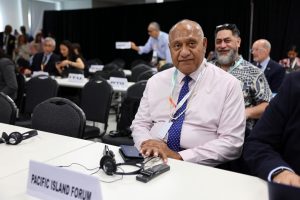
The opening session ended with a plea from young Lutrell John, who was one of the delegates to the SIDS Global Children and Youth Action Summit at the weekend.
The fresh-faced Antigua and Barbuda resident told delegates his generation wants a better, safer future.
He recalled the “lifechanging devastation” of Hurricane Irma in 2017 and is increasingly aware of the worsening climate crisis.
“I love my country, it’s beautiful, it’s my home but I fear for my future”, he said.
If we really want sustainable development, the voices of children must be at the heart of the conversation. “You need to listen to us and respect our ideas and our solutions”, he said.
Echoing the UN chief’s take, LI Junhua, UN Under-Secretary-General for Economic and Social Affairs (DESA) and Secretary-General of the SIDS4 Conference, said that the agreed ABAS commitment tells the SIDS’ story.
“But most importantly it shows the global community how we can together set out to support them. It offers an opportunity to turn the tide and set SIDS on the path to achieve resilient prosperity.”
He said that the conference will be “a catalyst for new and reinvigourated partnerships, financing and ambitious actions to support these extraordinary island nations to reach their potential.”
He called for everyone in the room to deliver the ambitious ABAS programme together.
President of the General Assembly Dennis Francis – who hails from the nearby Caribbean State Trinidad and Tobago – said the long-awaited SIDS4 conference “offers a powerful once in a decade platform” for action, under the ABAS action programme.
“If we do not undertake substantive reform of the international financial framework and the multilateral architecture – and their governance – developing countries including SIDS, cannot unleash their full potential to mobilise much-needed resources to achieve the 2030 Agenda and it’s SDGs”, he told the conference.
More than 20 world leaders, together with representatives from the private sector, civil society, academia and youth – close to 4,000 participants in all – have gathered at the verdant conference venue in the American University of Antigua close to the capital St John’s, to tackle critical issues impacting the future of SIDS.
Under the theme Charting the course toward resilient prosperity, the four-day Conference (27-30 May) will showcase new innovations and develop practical solutions to address critical SIDS-specific challenges driven by the climate emergency, spiralling debt and health crises.
The Conference will adopt The Antigua and Barbuda Agenda for SIDS (ABAS) – a Renewed Declaration for Resilient Prosperity, which sets out the sustainable development aspirations of small islands over the next decade and the support required from the international community to achieve them.
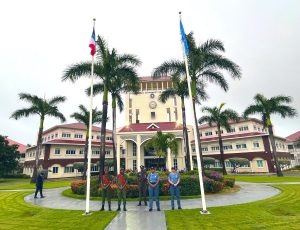
The SIDS across the Pacific, Caribbean and Atlantic, Indian Ocean and South China Sea are home to approximately 65 million people. They manage 19.1 per cent of the world’s Exclusive Economic Zones and the resources they hold.
Accounting for 14 percent of the world’s coastlines, SIDS boast a high degree of biodiversity. SIDS have pioneered renewable energy solutions, championed sustainable tourism while spearheading conservation efforts and making major strides in developing ocean-based economies.













